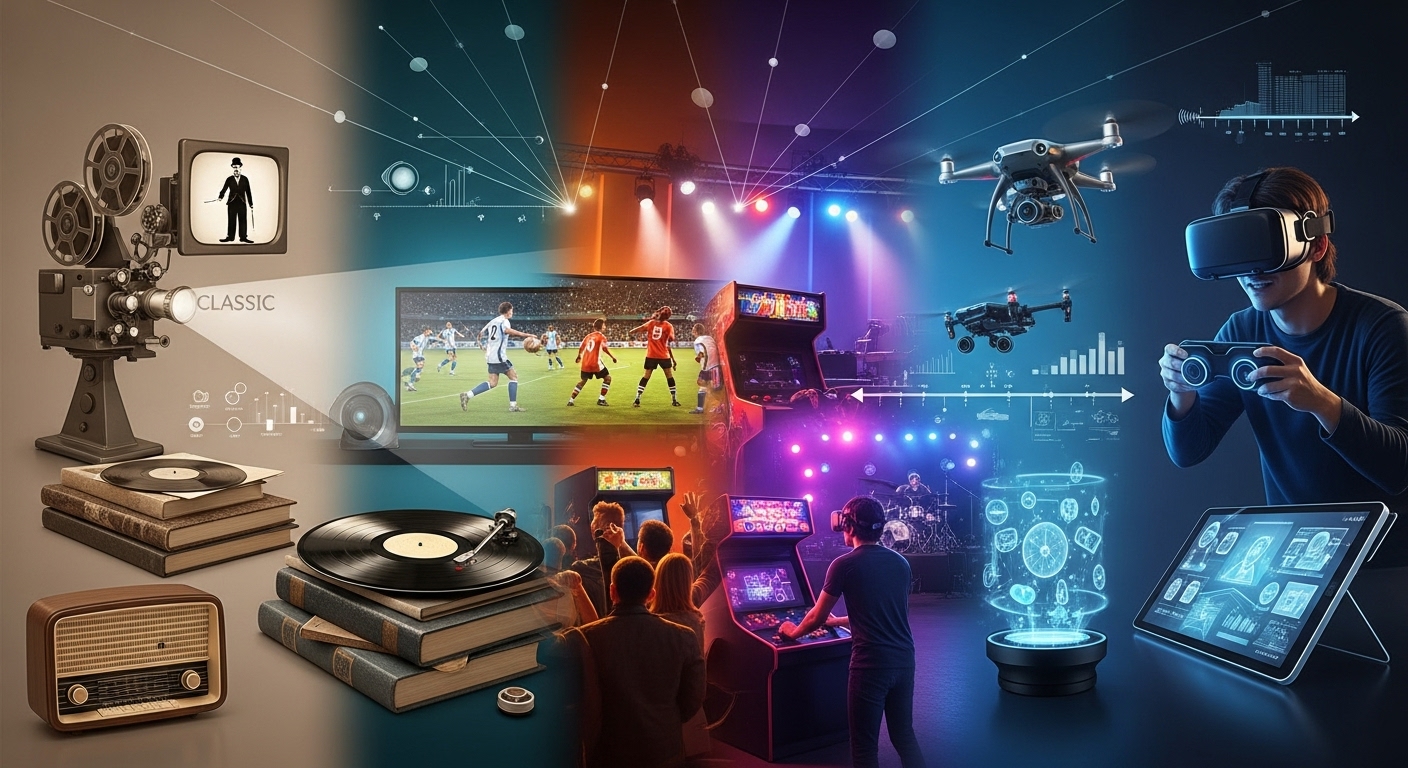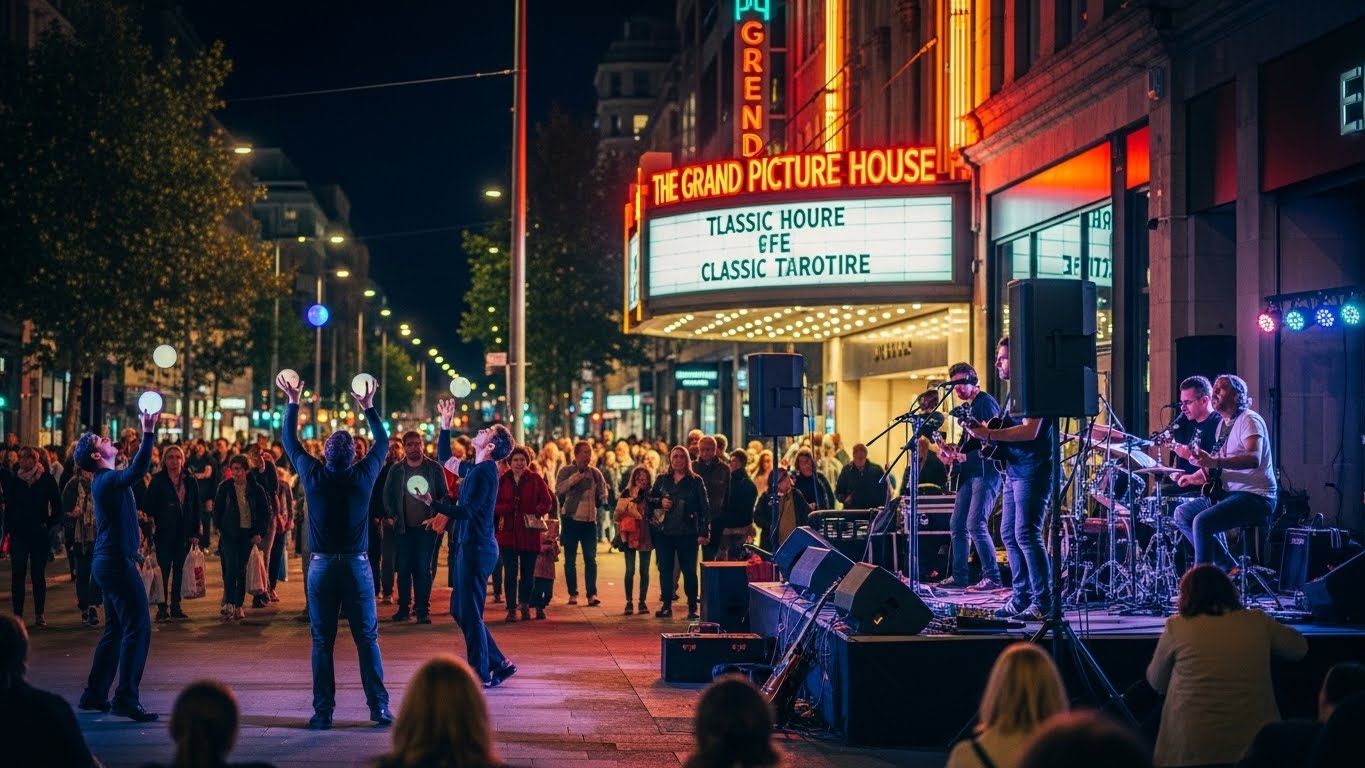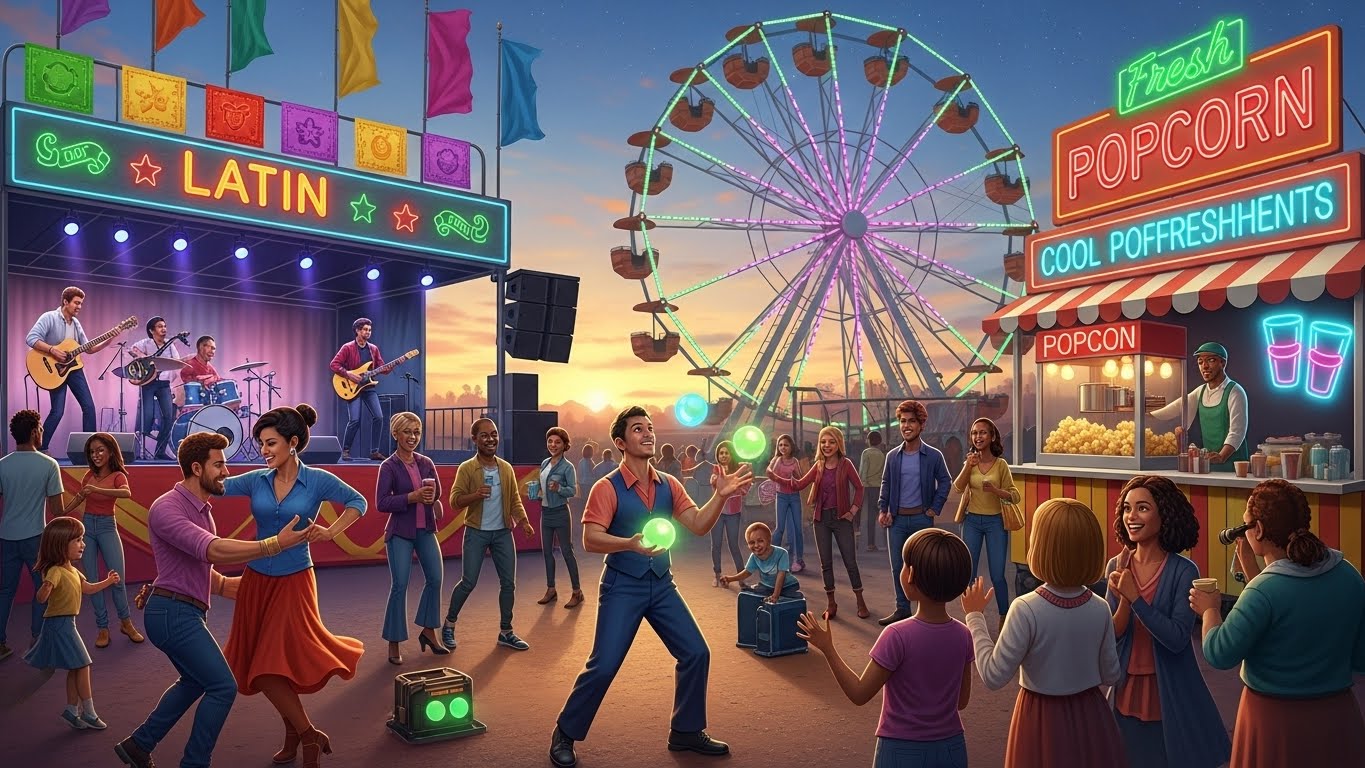Entertainment is a powerful force that has shaped human culture for centuries. From ancient storytelling around a fire to the modern streaming era, entertainment has always been a reflection of society, emotions, and technological progress. Today, we live in a world where entertainment is omnipresent, influencing our thoughts, aspirations, and lifestyles in ways that previous generations could never have imagined. In this blog post, we will take a deep dive into various aspects of entertainment, exploring its evolution, impact, and the trends that define contemporary pop culture.
The Evolution of Entertainment
Entertainment has a rich history, evolving alongside human civilization. In ancient times, storytelling was the primary form of amusement. Oral traditions allowed communities to share myths, legends, and moral lessons. Theater emerged as a more structured form of storytelling, particularly in Ancient Greece and Rome, where plays combined music, dialogue, and performance to captivate audiences.
With the invention of the printing press, literature became more accessible, and novels began to gain popularity. People could now immerse themselves in fictional worlds at home. The advent of photography and moving pictures in the 19th and early 20th centuries revolutionized entertainment. Films introduced visual storytelling on a scale never seen before, creating a global phenomenon that continues to dominate today.
Radio and television later became central pillars of entertainment. Radio brought music, drama, and comedy into homes, while television offered a visual medium that combined the intimacy of radio with the spectacle of cinema. Each technological leap expanded the ways audiences could engage with content, setting the stage for the digital revolution.
Cinema: The Heartbeat of Modern Entertainment
Cinema has always been more than just a form of entertainment; it is a reflection of society and a mirror to human emotion. From silent films to blockbusters, movies have captivated audiences worldwide. Iconic directors like Alfred Hitchcock, Steven Spielberg, and Christopher Nolan have pushed storytelling boundaries, blending art and commerce in ways that resonate with audiences on multiple levels.
The rise of Hollywood set the global standard for filmmaking, but regional cinema has also flourished. Bollywood, Nollywood, and European cinema have carved their niches, showcasing unique cultural perspectives and storytelling techniques. Today, cinema faces both challenges and opportunities with the advent of streaming platforms. While traditional theaters continue to thrive for blockbuster releases, online platforms allow filmmakers to reach global audiences instantly.
Special effects, CGI, and advanced sound design have transformed the cinematic experience. Audiences now expect immersive worlds, compelling characters, and narratives that reflect both personal and societal struggles. Despite technological advances, the core of cinema remains unchanged: storytelling that evokes emotions and connects people.
The Magic of Television and Streaming
Television has played a pivotal role in shaping modern entertainment. Early TV shows focused on variety programs, sitcoms, and news, creating shared experiences for families and communities. Shows like “Friends,” “The Simpsons,” and “Breaking Bad” became cultural touchstones, influencing fashion, language, and lifestyle.
The streaming revolution has redefined the television experience. Platforms like Netflix, Disney+, and Amazon Prime Video offer on-demand content, eliminating traditional schedules and giving viewers unprecedented control. This shift has democratized entertainment, allowing niche content to thrive alongside mainstream productions. Mini-series, documentaries, and international shows now reach audiences across borders, creating a truly global entertainment landscape.
Streaming has also empowered content creators to experiment with storytelling. Complex narratives, character-driven plots, and morally ambiguous protagonists have become more prevalent, reflecting the growing sophistication of viewers. Additionally, interactive shows and virtual reality experiences are beginning to blur the line between passive and participatory entertainment.
Music: The Universal Language
Music is perhaps the most universal form of entertainment, transcending language, geography, and culture. From classical compositions to contemporary pop, music has always been a way to express emotion, identity, and social commentary. Iconic artists like The Beatles, Michael Jackson, and Beyoncé have not only defined musical eras but also influenced fashion, politics, and lifestyle.
The digital era has transformed how we experience music. Streaming platforms and social media allow artists to reach global audiences instantly. Playlists, algorithm-driven recommendations, and viral trends shape listening habits, making music more accessible than ever. Genres continue to evolve, blending traditional styles with modern influences to create innovative sounds.
Live performances remain a cornerstone of musical entertainment. Concerts, festivals, and immersive experiences allow fans to connect with artists on an emotional level. The energy of a live show, the communal feeling of singing along with thousands of people, and the spectacle of stage production make music a deeply interactive form of entertainment.
Gaming: Interactive Entertainment Redefined
Video games have become a dominant force in contemporary entertainment. Once considered niche, gaming now rivals cinema and music in cultural significance. Modern games combine storytelling, strategy, and technology to create immersive experiences that engage players for hours. Franchises like “The Legend of Zelda,” “Grand Theft Auto,” and “Fortnite” have become household names, shaping popular culture and influencing other entertainment sectors.
The gaming industry has also pushed technological boundaries. Virtual reality, augmented reality, and realistic graphics enhance immersion, while online multiplayer platforms foster communities across continents. Games are no longer just about competition—they are social spaces, creative outlets, and even platforms for education.
Esports have elevated gaming to a spectator sport, drawing millions of viewers worldwide. Professional gamers, sponsored teams, and large-scale tournaments highlight the seriousness and appeal of this form of entertainment. The line between playing and watching is increasingly blurred, demonstrating the versatility of gaming as a cultural phenomenon.
Social Media: Entertainment in the Palm of Your Hand
Social media platforms have fundamentally altered how we consume and share entertainment. Short videos, memes, challenges, and viral content dominate the digital landscape. Platforms like TikTok, Instagram, and YouTube allow creators to engage audiences directly, bypassing traditional gatekeepers in music, television, and film.
This new form of entertainment emphasizes creativity, immediacy, and relatability. Audiences no longer passively consume content; they interact, remix, and participate. Trends emerge overnight, shaping fashion, language, and behavior. The democratization of content creation has allowed diverse voices and perspectives to flourish, reflecting the evolving nature of society.
However, social media also presents challenges. The constant flow of content can lead to overstimulation and a desire for instant gratification. Content creators face immense pressure to innovate and maintain relevance, often blurring the lines between personal expression and commercial entertainment. Despite these challenges, social media continues to be a dynamic and influential force in global entertainment.
The Impact of Entertainment on Society
Entertainment is more than leisure; it is a mirror of society. Movies, music, games, and social media reflect cultural values, social struggles, and human emotions. They shape perceptions, influence trends, and foster community. Iconic films and songs often become symbols of social movements, inspiring change and raising awareness on important issues.
Entertainment also offers psychological benefits. It provides escape, relaxation, and emotional catharsis. Stories allow audiences to experience empathy, explore different perspectives, and confront complex issues in a safe environment. Whether laughing at a comedy show, crying during a drama, or cheering at a sports event, entertainment connects people emotionally and intellectually.
At the same time, entertainment has the power to influence behavior and opinions. Media representation, celebrity endorsements, and viral trends shape societal norms, highlighting the responsibility that creators carry. Conscious entertainment that addresses social issues thoughtfully can educate, inspire, and promote positive change.
Future Trends in Entertainment
The future of entertainment is exciting, driven by technological innovation and changing consumer behavior. Artificial intelligence, virtual reality, and immersive experiences are redefining how stories are told. Interactive films, AI-generated music, and personalized content recommendations are just the beginning of a new era where entertainment adapts to individual preferences.
Globalization will continue to expand the reach of entertainment. International content, cross-cultural collaborations, and multilingual platforms allow audiences to explore diverse perspectives. Cultural exchange through entertainment fosters understanding and appreciation for different traditions, styles, and narratives.
Sustainability and ethical considerations are also emerging trends. The entertainment industry is increasingly focused on environmentally friendly production practices, inclusive representation, and responsible storytelling. Audiences are more aware of social and environmental issues, demanding content that aligns with their values.
Conclusion: The Timeless Allure of Entertainment
Entertainment is a dynamic, evolving force that touches every aspect of human life. It entertains, educates, and inspires, reflecting the complexities of our emotions, society, and technology. From ancient storytelling to digital streaming, from classical music to viral social media trends, entertainment continues to adapt and innovate, remaining a central part of the human experience.
As technology advances and cultural boundaries continue to blur, the future of entertainment promises unprecedented opportunities for creativity, connection, and engagement. Regardless of format or medium, the heart of entertainment remains the same: a shared human desire to experience, feel, and connect through stories, music, games, and art.
Entertainment is not just a pastime; it is a living, breathing testament to our collective imagination, creativity, and humanity. As we look ahead, one thing is certain—the world of entertainment will continue to evolve, captivate, and inspire generations to come.



